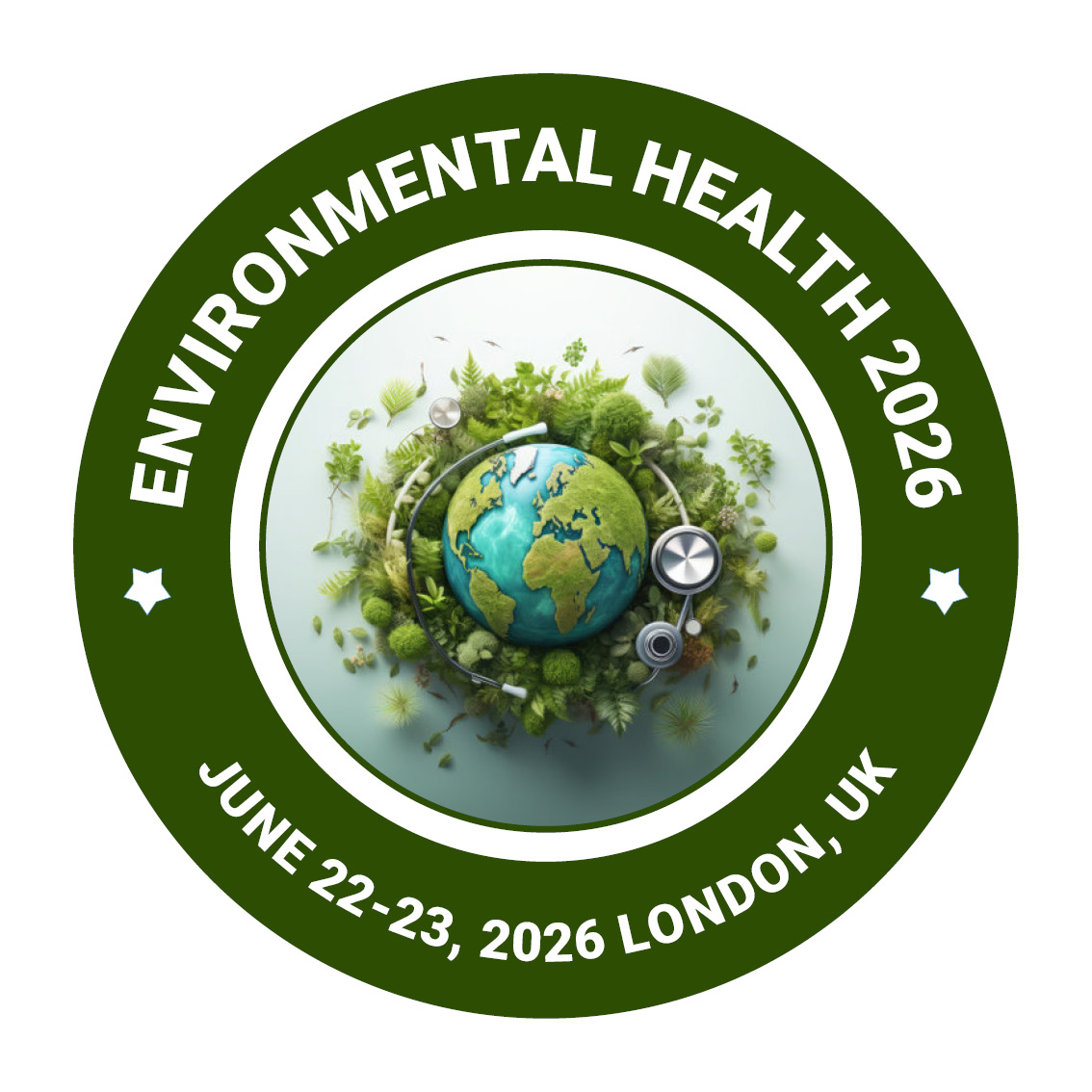Welcome Message
June 22–23, 2026 | London, UK
Join us for the 8th Global Summit on Environmental Health, a premier gathering of experts, researchers, and policy-makers dedicated to addressing critical challenges and innovations in environmental health.
Under the theme “Environmental Health in a Changing Climate: Innovations for a Sustainable Future,” this event will feature:
• Keynote Talks from world-renowned experts in environmental science and public health.
• Panel Discussions addressing pressing issues like climate change, pollution, and sustainable practices.
• Networking Opportunities to connect with industry leaders, researchers, and advocates shaping the future of environmental health.
Be part of a global forum committed to fostering collaboration, sharing groundbreaking research, and exploring actionable solutions for a sustainable and healthy future.
Visit the conference website for detailed program updates, speaker announcements, and exclusive early-bird registration offers.
We eagerly anticipate welcoming you to London for this significant event!
Register Now to reserve your spot!
Warm regards,
Jennifer Anne
Program Manager
About Conference
The 8th Global Summit on Environmental Health warmly invites researchers, policymakers, healthcare professionals, and industry leaders from around the world to join this prestigious gathering in London. The summit serves as a dynamic forum to share groundbreaking research, exchange ideas, and shape strategies that safeguard both public health and the planet.
Under the theme “Environmental Health in a Changing Climate,” the summit will highlight critical issues such as climate-related health impacts, sustainable waste management, air and water quality, and the role of evidence-based policy in reducing environmental risks.
Participants will engage in keynote addresses, expert panel discussions, and interactive workshops designed to spark collaboration and inspire innovative, practical solutions. Whether you are a scientist, educator, student, or industry professional, Environmental Health 2026 offers a unique opportunity to connect with global leaders and contribute to building a healthier, more sustainable future.
Sessions and Tracks
TRACK 1: Environmental Health
Explores how air, water, soil, and climate factors influence human physical and mental well-being. Sessions will highlight global and regional challenges, methods for environmental monitoring, and innovative sustainable-living practices. Case studies will showcase community interventions, cross-sector collaborations, and emerging technologies that protect both ecosystems and public health.
TRACK 2: Human Impact on Environment
Examines how industrialization, urbanization, deforestation, and changing lifestyles degrade ecosystems, threaten biodiversity, and deplete natural resources. Presentations will feature strategies for responsible industry, nature-based solutions, habitat restoration, and education campaigns that inspire sustainable consumption patterns.
TRACK 3: Climate Change & Health Impacts
Analyzes health effects of rising temperatures, extreme weather, and shifting disease patterns. Topics include heat-related illnesses, mental-health impacts of climate anxiety, and resilience of health systems. Speakers will share best practices in climate-adaptation planning, early-warning systems, and cross-disciplinary mitigation projects.
TRACK 4: Air Quality & Respiratory Diseases
Highlights the health burden of pollutants and allergens on respiratory and cardiovascular systems. Coverage includes monitoring technologies, public-policy successes, and innovative solutions such as green transportation, low-emission zones, and indoor air-filtration techniques. Discussions will also address socioeconomic inequities in exposure.
TRACK 5: Water Quality & Safety
Focuses on ensuring access to safe drinking water, effective sanitation, and prevention of waterborne diseases. Sessions include advanced filtration systems, climate-resilient water infrastructure, and integrated watershed management. Successful community-led sanitation and emergency response during droughts or floods will be featured.
TRACK 6: Sustainable Waste Management
Addresses environmental and health impacts of industrial, medical, and municipal waste. Emphasizes circular-economy practices, waste-to-energy technologies, and strategies to reduce single-use plastics. Panels will explore policy incentives, public education, and cutting-edge recycling innovations.
TRACK 7: Policy & Environmental Health
Explores how policy, regulation, and governance drive public-health protection. This track highlights international frameworks, enforcement mechanisms, and stakeholder engagement. Presenters will share lessons learned from implementing climate accords, pollution controls, and urban sustainability plans.
TRACK 8: Occupational Health & Safety
Covers workplace hazards such as chemical exposure, ergonomic stress, and climate-related risks like heat stress. Sessions will address risk assessment, personal protective equipment, and mental-health programs. Industry leaders will present models for cultivating a culture of prevention and compliance.
TRACK 9: Environmental Toxicology
Studies chemical, physical, and biological hazards affecting humans and ecosystems. Topics include heavy-metal exposure, endocrine disruptors, and bioaccumulation in food chains. Cutting-edge biomonitoring tools and regulatory approaches for emerging contaminants will be highlighted.
TRACK 10: Emerging Infectious Diseases
Investigates how environmental changes drive vector-borne and zoonotic illnesses. Sessions focus on integrated “One Health” strategies, genomic surveillance, and rapid-response protocols. Case studies will examine how deforestation and climate variability alter disease vectors.
TRACK 11: Renewable Energy & Public Health
Highlights the health and environmental benefits of transitioning to clean energy sources such as solar, wind, and geothermal. Presentations will explore policy incentives, community solar initiatives, and the health gains of reducing fossil-fuel reliance. Real-world success stories will illustrate co-benefits for air quality and economic development.
TRACK 12: Environmental Epidemiology
Provides data-driven insights into population-wide effects of environmental exposures. Topics include geospatial analysis, big-data applications, and long-term cohort studies. Sessions will also demonstrate how citizen science and low-cost sensors can democratize data collection and inform public policy.
TRACK 13: Urbanization & Health Risks
Examines challenges of rapidly growing cities, including pollution, sanitation, overcrowding, and limited healthcare. Discussions will explore sustainable city planning, green transportation networks, heat-island mitigation, and smart-city technologies that promote public well-being.
TRACK 14: Food Safety & Contaminants
Addresses chemical, microbial, and environmental risks across the food supply chain. Presentations will feature advanced detection techniques, pesticide and antibiotic management, climate-related food security issues, and international regulatory harmonization to ensure safe and nutritious diets.
TRACK 15: Soil & Agriculture Health
Explores sustainable farming methods, soil biodiversity, and contamination prevention. Sessions include regenerative agriculture, precision farming, and soil carbon sequestration as a climate solution. Experts will discuss how soil health directly influences nutrition and long-term food security.
TRACK 16: Environmental Justice
Emphasizes equity in access to clean air, safe water, and healthy living conditions. Panels will highlight community-based participatory research, legal frameworks addressing environmental racism, and grassroots activism. Real-life case studies will show how inclusive policies reduce health disparities.
TRACK 17: Disaster Preparedness
Focuses on reducing health impacts of natural and human-made disasters such as floods, wildfires, and chemical spills. Topics include early-warning systems, emergency response planning, climate adaptation, and post-disaster mental-health support. Best-practice examples from recent global events will be shared.
TRACK 18: Noise Pollution & Mental Health
Explores how chronic noise exposure contributes to stress, sleep disruption, and cardiovascular risk. Sessions will cover noise mapping, innovative urban design solutions, quiet-zone policies, and community education to reduce noise at its source.
TRACK 19: Green Buildings & Infrastructure
Promotes eco-friendly construction and urban design to improve occupant health and reduce emissions. Presentations will address energy-efficient materials, indoor air quality, smart-building technologies, and strategies for retrofitting existing structures to meet green standards.
TRACK 20: Biodiversity & Ecosystem Health
Highlights the essential role of species diversity in maintaining ecosystem services such as pollination, water purification, and disease regulation. Discussions will include habitat restoration, protected-area management, and the links between biodiversity loss and emerging infectious diseases.
Benefits of Participation
Benefits of Participation – Speakers
-
Achieve worldwide recognition for your professional and research profile.
-
Earn continuing professional development credits.
-
Present and explore cutting-edge scientific advancements.
-
Build lasting professional relationships at networking and social events.
-
Showcase your work with a one-page advertisement in the abstract book and distribute flyers that can reach up to 1 million readers.
-
Broaden your perspective by learning about new topics and research beyond your main area of expertise.
-
Enjoy a unique mix of education, networking, and enjoyable activities in one event.
Benefits of Participation – Delegates
-
Enhance your skills through professional development opportunities.
-
Gain inspiration and motivation from an engaging and energizing conference environment.
-
Discover new methods and approaches to apply within your organization or industry.
-
Join interactive online sessions to exchange ideas with researchers and experts in Environmental Health.
Benefits of Participation – Sponsors
-
Increase global visibility, expanding opportunities to attract new business partners.
-
Present new technologies, products, or services to a diverse international audience.
-
Take advantage of the world’s leading platform for Environmental Health innovation.
-
Generate high-quality leads through direct interaction with conference participants.
-
Build a strong professional network with others who share similar business goals.
-
Use the event as an opportunity for strategic reflection and planning to grow your business.
-
Gain insights by benchmarking key business strategies with industry experts.
-
Obtain practical answers to your business questions and challenges.
-
Secure new deals and collaborations, as many organizations finalize agreements during our conferences.
Benefits for Young Scientists
-
Present your research through oral presentations to an international audience.
-
Exchange ideas with accomplished researchers and mentors.
-
Compete for the Young Scientist Award, which includes a recognition certificate and a commemorative memento.
-
Gain timely updates and guidance for your research journey.
-
Create collaborative networks with other young researchers for professional growth.
-
Receive motivation to achieve your full potential, making a meaningful impact on the field.
Participation Options
The Environmental Health 2026 Conference offers a variety of participation formats:
-
Keynote Speaker: 30–45 minutes
-
Oral Presentation Speaker: 20–30 minutes (single presenter)
-
Workshop Speaker: 45–50 minutes (multiple presenters allowed)
-
Special Session Speaker: 45–50 minutes (multiple presenters allowed)
-
Symposium Speaker: 45+ minutes (multiple presenters allowed)
-
Delegate: Full access to all sessions with complete registration benefits
-
Poster Presenter: Present a poster and enjoy all delegate privileges
-
Remote Participant: Join via video presentation or e-poster
-
Exhibitor: Display products or services with a reserved exhibition booth
-
Media Partner
-
Sponsor















